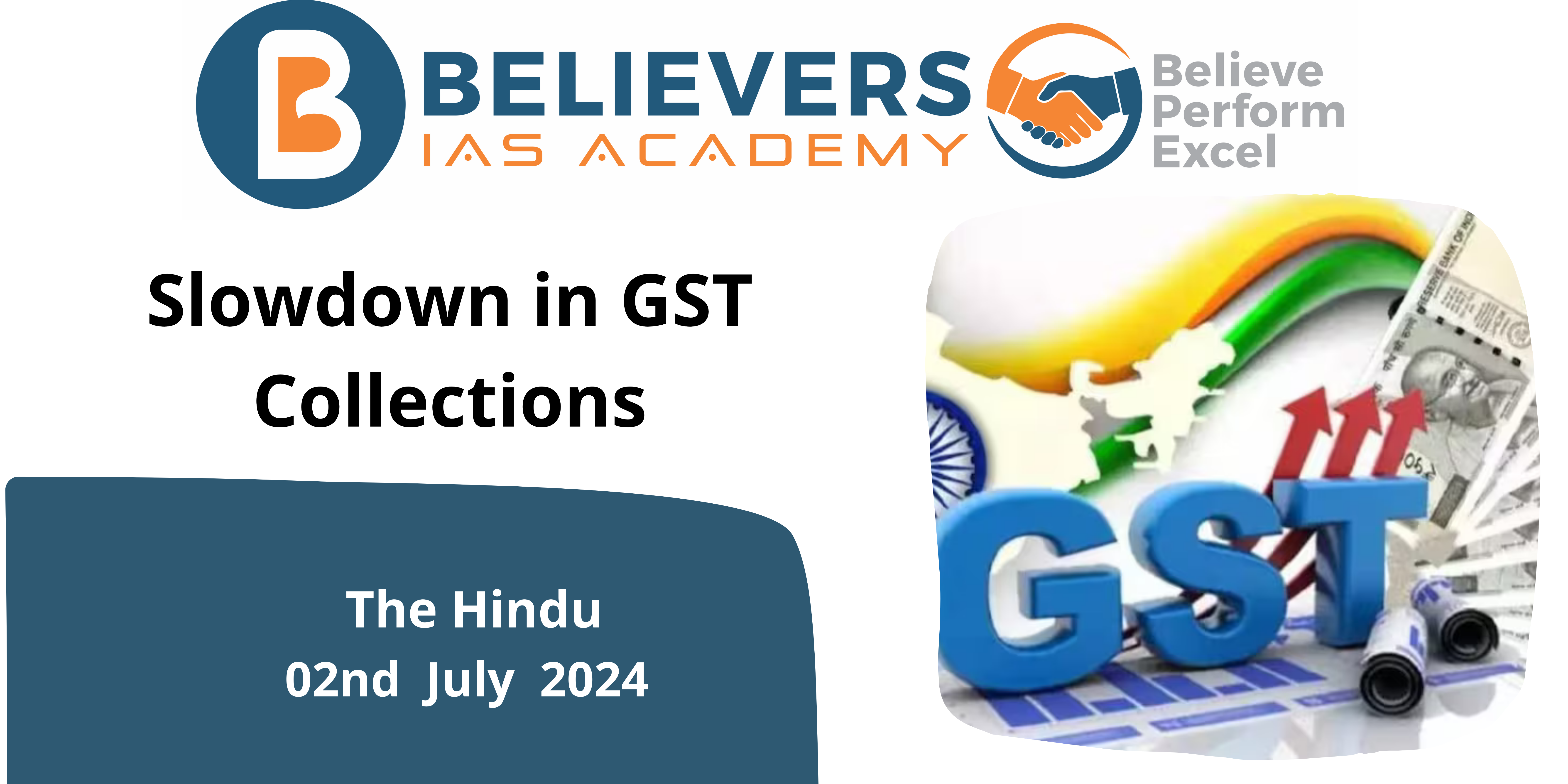Slowdown in GST Collections
Context:
India’s gross Goods and Services Tax (GST) collections grew by 7.74% in June, reaching ₹1.74 lakh crore, the slowest growth in three years.
Relevance:
GS-03 (Economy)
Key Highlights:
Lack of Official Statement:
- The Finance Ministry did not release an official statement on June’s GST collections, diverging from its usual practice of releasing detailed monthly GST revenue reports.
Growth Comparison:
- The growth in June’s GST revenues was slower compared to April (12.4%) and May (10%) 2024.
- June’s collections were only 0.73% higher than May’s gross tally of ₹1.72 lakh crore.
First Quarter Performance:
- Gross GST revenues for the first quarter of the fiscal year were about ₹5.57 lakh crore, a 10.2% increase from ₹5.05 lakh crore in the same period last year.
Net GST Collections:
- In April, net GST collections rose by 15.5% to ₹1.92 lakh crore. In May, growth eased to 6.9%, reaching ₹1.44 lakh crore.
- June’s net collections were not disclosed.
IGST Settlements:
- In June, ₹39,600 crore was settled to the central GST account from Integrated GST (IGST) collections, and ₹33,548 crore was given to States from the IGST pool.
Industry Observations:
- Tax experts noted the overall positive trend in GST collections despite the slowdown in June.
- There is industry hope that this trend will prompt the GST Council to rationalize the GST rate structure as discussed in their last meeting.
Goods And Services Tax (GST):
GST is a value-added tax imposed on most goods and services for domestic consumption, representing a significant tax reform in independent India’s history.
- Implemented on July 1, 2017, it consolidates nearly all domestic indirect taxes, except for petroleum, alcoholic beverages, and stamp duty.
Key Features:
- GST applies to the ‘supply’ of goods or services, departing from the traditional taxation based on manufacturing, sale, or service provision.
- Unlike origin-based taxation, GST operates on the principle of destination-based consumption taxation.
- Both the Centre and States levy tax concurrently on a shared base, termed Central GST (CGST) and State GST (SGST), respectively.
- Import of goods or services is considered inter-state supplies, subject to Integrated Goods & Services Tax (IGST) and applicable customs duties.
- CGST, SGST, and IGST rates are mutually agreed upon by the Centre and States, with multiple rates (5%, 12%, 18%, and 28%), along with specific rates for gold and precious stones.
GST Council:
- Constitutional Body: Established under Article 279A, advising Union and State Governments on GST-related issues.
- Composition: Chaired by the Union Finance Minister, includes Union State Minister of Revenue or Finance, and Finance or Taxation Ministers from all States.
- Federal Representation: Recognized as a federal body, ensuring representation for both the Centre and States.
Goods and Services Tax (GST) Appellate Tribunal:
- The proposal for the establishment of the Goods and Services Tax (GST) Appellate Tribunal aims to address disputes arising from the GST regime in India.
- It is a quasi-judicial body.
- This independent body hears appeals against decisions made by GST authorities or the Appellate Authority, providing a dedicated forum for dispute resolution.
- Comprising a national bench and regional benches, it is headed by a chairperson appointed by the central government, the tribunal seeks to streamline the adjudication process and alleviate the burden on the judicial system.
- By offering a structured hierarchy for appeal, from the Adjudicating Authority to the Appellate Tribunal, High Court, and Supreme Court, the GST Appellate Tribunal intends to ensure fair and efficient resolution of disputes under GST regulations.
- By establishing a specialized tribunal, the aim is to unburden the judiciary and expedite the resolution of GST-related conflicts.
- The introduction of the GST Appellate Tribunal is anticipated to enhance the overall efficiency and effectiveness of the GST system in India.
- Providing an independent mechanism for dispute resolution, it will contribute to promoting greater certainty and predictability in the GST framework, thereby helping to combat tax evasion and ensure compliance with taxation regulations.



